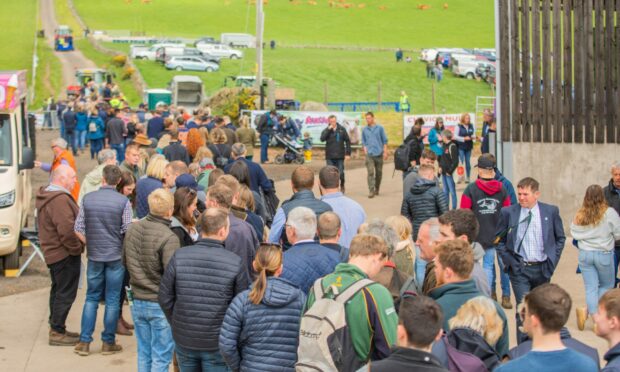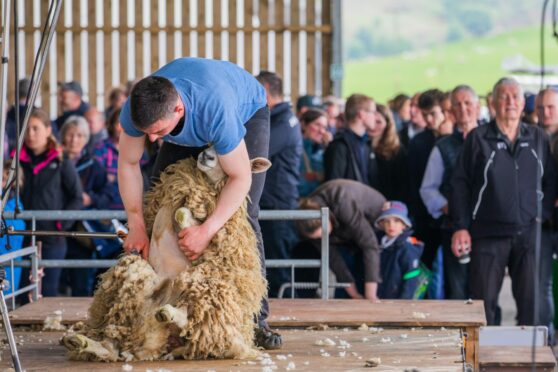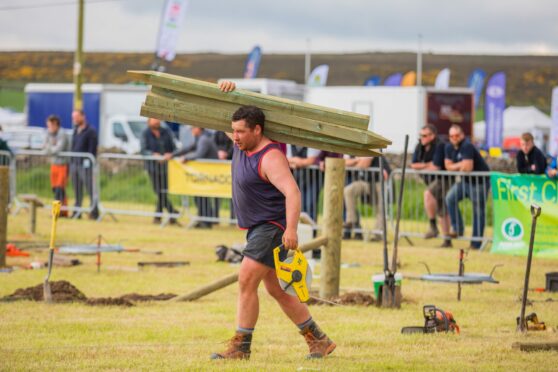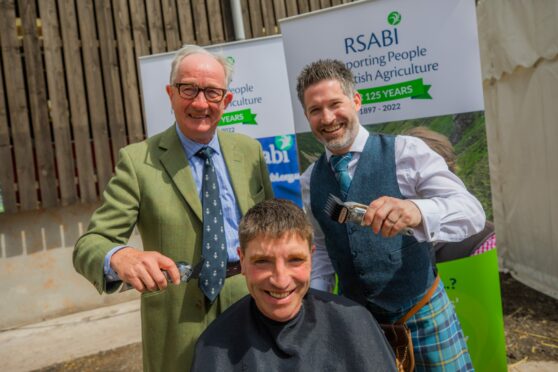Scotland’s sheep industry flocked to the fields of Over Finlarg near Dundee to celebrate their sector in record-breaking Scotsheep crowds.
Thousands of commercial farmers and pedigree breeders, 40 sheep breed societies and 180 trade stands featuring machinery and livestock health firms, industry associations, auctioneers and rural advisers turned out at the National Sheep Association’s (NSA) event which had been postponed due to Covid regulations on three previous occasions.
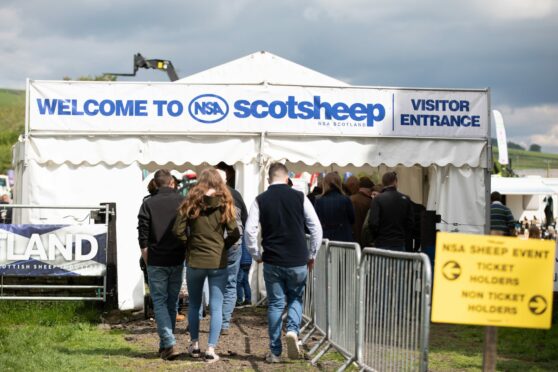
Buoyant sheep prices, an opportunity to socialise on a successful farm and the first Scotsheep since 2019 meant the mood was upbeat, but the celebratory atmosphere belied the concerns and uncertainty voiced in countless conversations around the farmyard about the future direction of Scottish agriculture.
Former United Auctions executive chairman, David Leggatt, who opened the event, said that as chair of the rural charity, RSABI, he regularly heard first hand accounts from farmers who were worried, particularly about the continuation of government support.
“The main responsibilities of government include food security, food supply and food safety,” he told the packed audience seated in a pristine cattle court.
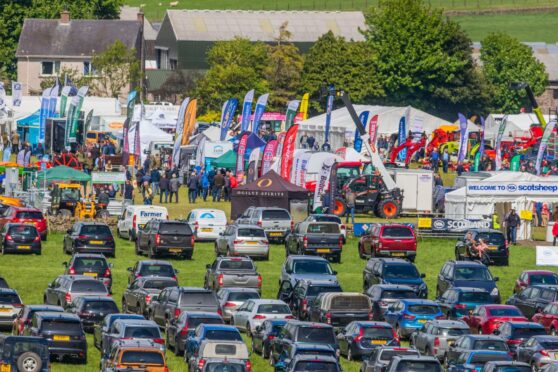
“While recognising climate change, the importance of achieving net zero and improving biodiversity, we cannot ignore farmers’ role as providers of food for the nation.
“With the brilliant scientific base and progressive industry we have in Scotland, I believe that with balance and cooperation we can achieve the desired goals. I hope that government and industry develop post-2024 policy with significant support given to production and infrastructure as it’s essential to maintain the critical mass of both Scottish lamb and Scottish beef.”
Green loans
Carbon is the industry’s hot topic, and the event’s headline sponsor, Virgin Money used the opportunity to launch a £200m “green loans” fund to help farmers move to net zero by investing in changes which reduce on-farm emissions. The bank says loans are available if a farmer completes a carbon audit and is borrowing over £50k for renewable energy, energy efficiency initiatives or activities that reduce greenhouse gases – although each application will be subject to affordability.
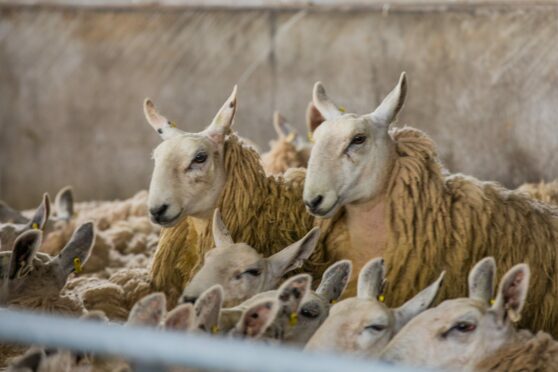
The bank’s move follows a carbon audit of Over Finlarg, the 740-acre Scotsheep host farm owned by Robert and Hazel McNee, which is home to 1100 commercial breeding sheep, 100 pure Texels and pedigree Bluefaced Leicesters and 180 pedigree suckler cows.
The audit concluded that the farm is “very efficient” but suggested that avoiding ploughing wherever possible, planting hedgerows and investing in solar panels to power a water pump to reduce energy use, would help the McNee family meet their net zero targets.
Eyes often glaze over at the mention of carbon, but Simon Haley, the director of Carbon Metrics, which conducted the Over Finlarg audit, insisted that education can clarify how the looming changes can also provide opportunities for farmers to improve efficiency.
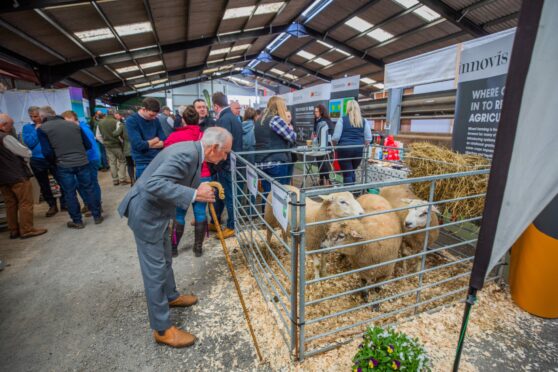
He said: “Improving your carbon footprint is simply about business efficiency, so the aspects you would look at on your farm such as feed, fuel, fertiliser and energy input – most of those actions are going to be good for your carbon footprint. That’s what we’re trying to get across.”
He acknowledged that carbon tools are not standardised, and advised farmers to use Agrecalc, Cool Farm Tool or the Farm Carbon Toolkit. He said a full carbon audit by a consultant costs around £1800 and the Scottish Government is currently making a one-off contribution of £500.
Virgin Money’s head of agriculture, Brian Richardson, added: “Everyone accepts there needs to be standardisation, but it shouldn’t stop any farmers starting on the journey and starting to understand what’s involved.”
Sale
The sale of ewe hoggs is always a crowd puller and this year was no exception with a new Scotsheep record of £2000 paid for a pair of Badgerface Texels from Stuart and Wendy Hunter, West Cairnhill, Insch.
They were purchased by Lancashire breeders, Caroline Brown and Sheila Mason.
Both are sired by Cleenagh Biggy and bred from their foundation ewe, an imported female which has already bred several four figure priced sheep.
The couple also topped the Blue Texels, selling a pair for £1500 per head to David Alexander, Millside, Galston. One is by Lyles Eagle with the other being sired by Hunters Deerstalker.
The champion pairing from Robbie Wilson’s Milnbank flock from Turriff, made £1600.
These two are both by Castlecairn Doodlebro, a full brother to the 38,000gns Castlecairn Doodlebug, and sold to David Pickford, Cheshire.
The McNees black North Country Cheviots made £1300 to Dean Anderson, Elgin, with all the proceeds donated to Prostate Scotland.
The family also sold commercial Texel hoggs with Beltex cross lambs at foot up to £250 per head.
Competitions
Meanwhile, the winner of NSA’s next generation Shepherd of the Year competition was Ewan Runciman from Lauder in Berwickshire. Freddy Fulford from Banavie, Fort William was in second place, Bill Gray of Galston, Ayrshire was third and Ruaridh Lawrie, Balintore, Kirriemuir was fourth.
The event’s sheepdog trial was won by Elinore Nilsson from Alyth, Perthshire.
The quickshear champion was Hamish Mitchell and Archie Paterson was runner-up.
In the fencing event, HVB were first, Knoxfield Estate took second place and Samson Fencing were third.
The open stockjudging was won by Kevin Laing, Anna Smith was second and Harry Gemmill took third place.
The young farmers stockjudging was won by John Graham, Gavin Law was second and Muriel Forbes third.
